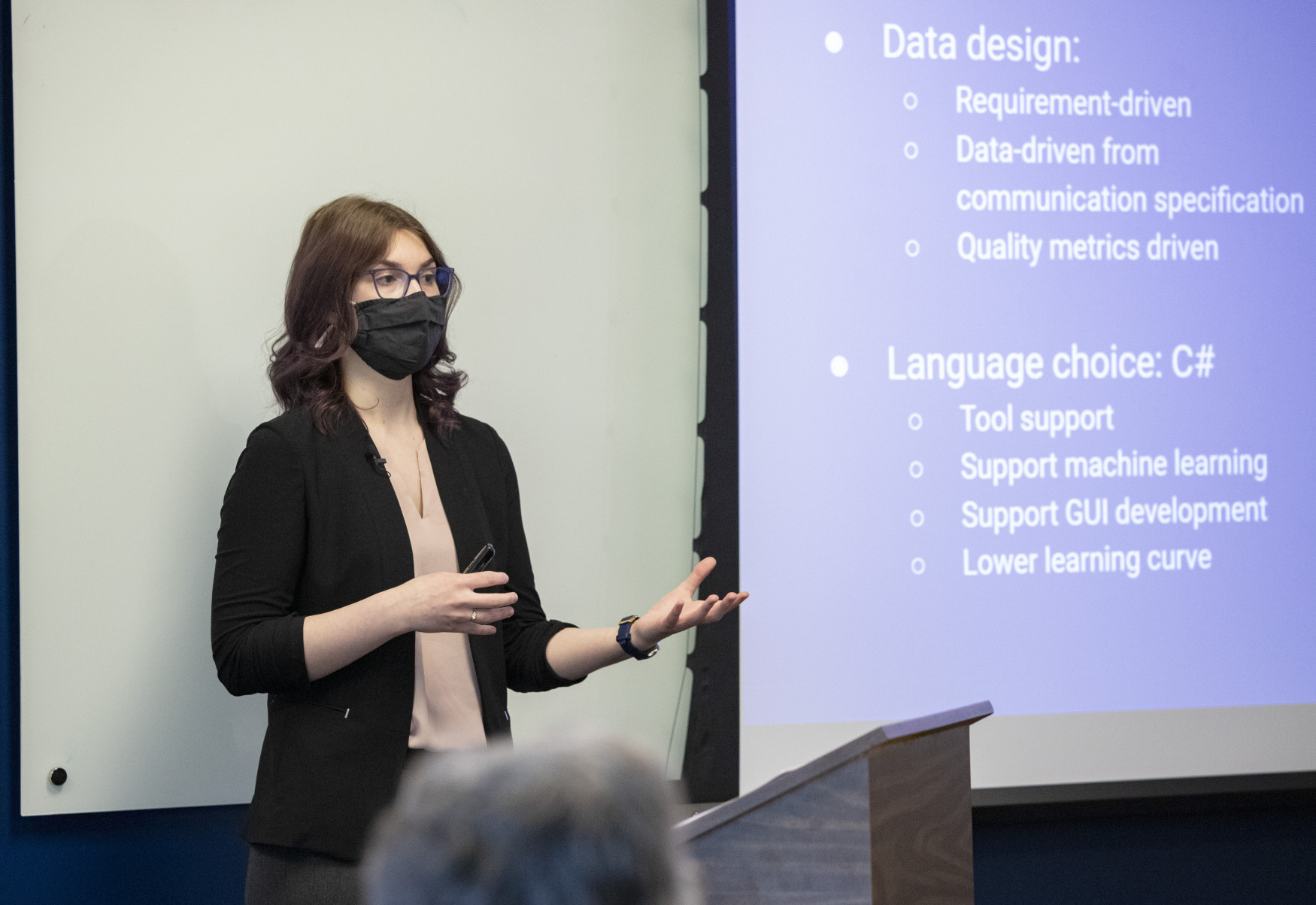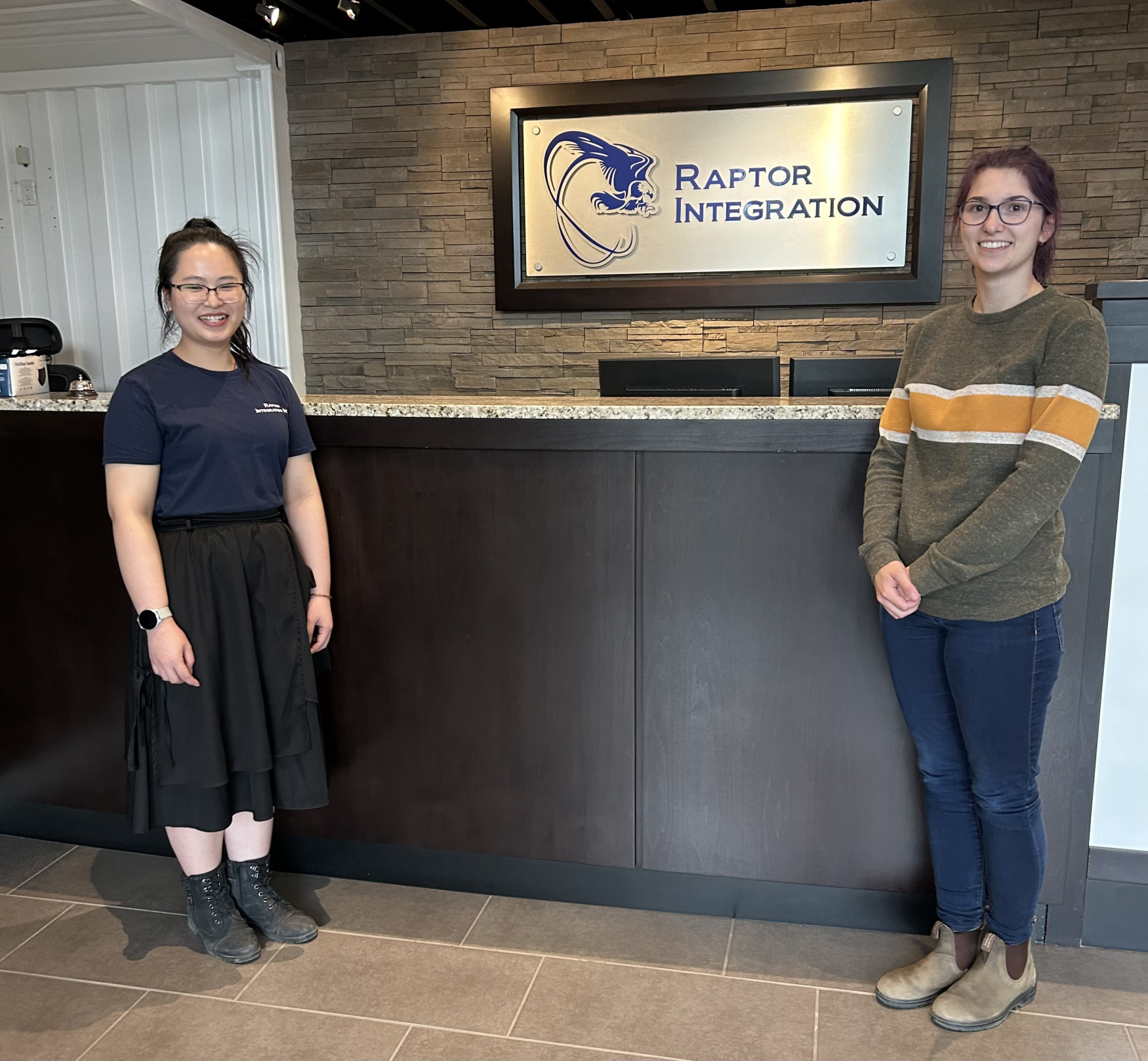As she approached the final stretch of her one-year work term at Raptor Integration, Brianna Pham, a third-year Bachelor of Computer Science student, sat down with her supervisor, Lorelei Guidos. As a former TRU co-op student of the year with five work terms on her resume, Guidos related to Pham’s position and understood the extraordinary value of co-op and uses those experiences to inform her leadership style.
Cultivate an experiential learning environment
Assessing a student’s transferable skills is a good starting point to ensure they are prepared when engaging in meetings, writing and responding to emails, and planning and executing tasks. It’s vital for an employer to invest in a co-op student with time, training, education and mentorship.
“When I was in my first work term at Raptor, there wasn’t anyone else at the same level as me,” Guidos said. “I was very new, and there weren’t any recent hires that weren’t co-op students. There were so many things that I wished I had been told and many things that I wished I had known.”
When Guidos returned to her role at Raptor after graduation, she made it her mission to provide specific support regarding training, goal setting, motivation and development.
“My recommendation to employers? Buy into the person you’re hiring — that’s one of the things we’ve been able to do with everyone we hire. We always look for the personality. We know we’ll have to train in technical skills, but you can’t teach passion or personality, so if you find and support someone with that spark — someone like Brianna, who does incredible work and brings so much value to our business,” Guidos said.
That level of care and support was of great benefit to Pham.
“Lorelei listened to us and asked many questions about how we wanted to spend our time and what we wanted to learn. We feel close to her. Although she’s our supervisor, she feels like a friend.”
Tailor the co-op experience
To help students identify their passions, goals and vision for the work term, it’s critical to see them as individuals. It’s equally important to be consistent when managing a team, so everyone gets the same level of support, even if the approaches differ.
“During this term, I’ve been working on interface designs, which I love. Lorelei allowed me to develop more in roles that I’m passionate about,” Pham said. “Before, I could do some basic tasks I learned from my class, but then I grew more through advanced processes. It’s given me a lot of motivation and made my performance more robust, more advanced and, as a result, more innovative.

Lorelei Guidos addresses faculty and other spectators during her capstone project presentation during her studies at TRU.
Guidos added, “I believe that work terms are completely customizable. Currently, two co-ops are working with us — one from the comp-sci side and one from software engineering. Both have comparable skills and the same contract length; they’re working on completely different projects, absorbing different learning styles and receiving various types of feedback. Knowing the difference between the programs and tailoring everyone’s projects to support their performance and areas of passion and expertise is essential. There are always opportunities to understand the programs better, tie it back with the students and then tailor their co-op experience to them instead of just having some generic co-op position open.”
Community building
Encouraging students to meet with different professionals for exploratory conversations allows students to explore different learning paths, jobs, roles and output. “Interacting with other professionals in the organization is a priority and a necessity,” Guidos said.
“Brianna enjoys user interface (UI) work, and we wanted to explore projects in that realm. While I’m Brianna’s supervisor and mentor, UI is not my area of expertise, so we brought someone else in to support us. And now, if she has a question that she thinks someone else can answer, she will seek out other people in the company. Integrating students into the team gives more opportunities to bring the benefits of interconnections and interactions into project work.”
Curiosity is key
TRU’s Career and Experiential Learning (CEL) department encourages students to be curious, inquisitive and well-prepared, not only in job interviews or on their first day, but in their ongoing performance.
“Telling a story that exemplifies your organizational skills or your passion for mentorship and sharing details in a narrative form makes for a rich conversation or interview,” Guidos said. “After Brianna’s interview, I turned to everyone on the panel and said, ‘I love her personality!’ Everyone agreed. We asked her about her mentorship work and she lit up when talking about it. Curiosity is one of the best drivers there; it’s so tightly coupled with passion and personality, which we’re looking for in a new hire.”
Leanne Mihalicz, Co-operative Education co-ordinator, agrees.
“I think it is great for students to approach co-op with an open mind and explore various opportunities, including those outside of Kamloops. Brianna is a great example of this, having relocated for co-op. I encourage students to expand their network, solve problems and develop strong interpersonal skills.”
As learning develops through active engagement, students’ questions increase in depth, nuance and specificity. Co-op students should show their employer they’ve done some investigation and reflection. Employers who exemplify patience, provide clear explanations and listen intently in conversations support students’ efforts to thrive. While employers are the mentors, they can also learn from their co-op students, which makes a meaningful experience for everyone.
“When we first started my co-op, I worried about asking questions, but Lorelei encouraged me to ask more to be curious and check in often. I overcame that fear and learned a lot through her responses and feedback — again, we feel comfortable with her — so she makes that easy,” Pham said with a laugh.
Guidos added, “I’m very engaged in the technical side of work and often work on projects at the same time or even the same projects as the co-op students. In those cases, we’re in constant contact, but if I’m away on a work trip, I’ll send an email every few days, depending on the task breakdown. Nonetheless, the co-ops don’t hesitate to reach out. It’s important to keep a forum open for students so they feel comfortable approaching you.”
Make space for answers to unfold
Creating an environment that is interactive and accessible allows for constructive conversations, which supports learning and organic connections.
“Often, when co-op students ask me a question, I’ll answer with another question that pulls something else out of them,” Guidos said.
“In their own way, they’ll discover how the pieces connect. It allows them to help shape your interactions through that curiosity lens. It also allows us to see the individual contributions of the students. When you enable organic problem-solving, you make space for growth. Exploring different interpretations of a challenge can lead to a more meaningful solution because you’ve worked it out together.”
Circle back and check in
While there is ongoing day-to-day communication, midterm check-ins can help a student regroup or refocus, Guidos said.
“It’s a chance to sit down, discuss the original goals, discuss any high or low points and adjust accordingly. That way, an employer knows whether they need to continue to work closely with the student or if they can give them more autonomy or independence. I don’t train Brianna much anymore. She’s now coming to me with the same questions our full-time employees ask. I’m still providing feedback to ensure things are on track — especially in the early stages of a project.”
Technical and transferable skill development
Co-op is not just about the technical aspects of an experiential learning opportunity; there’s potential for growth in interpersonal and administrative skills. Applying a professional approach to time management, organization and communication — in addition to the specific details of the particular role — also benefits students’ academic well-being.
“My technical and transferable skills are growing,” Pham noted. “My communication skills are improving through these work terms. English is not my first language, so it’s sometimes tricky for me to explain something, but everyone here is patient, kind and helpful, which makes me feel strongly bonded with my colleagues and the company.”
Multidimensional learning
Applying practical theories in the workplace is like visualizing something from a textbook in a 3-D shape. A deeper understanding of how your degree manifests into work can increase excitement, enthusiasm and appetite for learning. Also, knowing what employment opportunities exist supports the transition into professional spaces after graduation.
“I could not imagine what the day-to-day looked like as a software developer or in computer science, but I could see it clearly after being with Raptor for a few months,” said Pham. “I could also see a difference within myself from that first day to the current date. I’m curious about how I’ll be able to apply this learning when I go back to university and then take that classroom learning back to work on a higher level.”
Learn more about co-op and Career and Experiential Learning at tru.ca/cel


